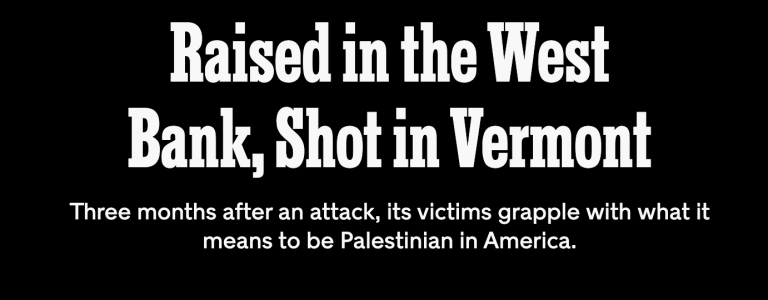Within about a month of each other, two articles came out discussing how America’s most prominent liberal newspapers—the New York Times and the Washington Post—have both abjured proper standards of journalism when covering the Israel/Hamas war. (Further, the other day the Torygraph wrote about how the BBC does the same thing.) And, of course since all three criticized venues are on the Left, their biases run in the same direction: towards Hamas or Palestine and against Israel.
The first headline below is from conservative National Review, and you can read it by clicking on the headline below or reading it archived here. The second headline is from Quillette, and you should be able to access it directly by clicking on the second headline.
The articles differ slightly, with criticism of the Post dealing with its direct biases in reporting, while that of the NYT, written by a historian, showing its abysmal understanding of Middle East history, which, coincidentally, makes Israel look bad. (It’s clearly not a coincidence, as the distortions always fit the liberal narrative.). I’ll just give one or two examples of bias from each article because you can read them yourself.
This, from the WaPo, is a bad one, verging on blood libel against Israel. But there are lots of other examples that I’ll pass over:
Once more, three days after the Post’s flawed military analysis [denying Hamas’s use of hospitals as headquarters], a team of the outlet’s senior reporters, including its Istanbul and London bureau chiefs, wrote about Israel returning dozens of Hamas bodies recovered in northern Gaza.
The IDF initially brought the bodies back to Israel to determine whether they were in fact Israeli hostages. The IDF then returned those bodies it had identified as Hamas fighters.
In its report on the body return, the Post cites a statement from the “Hamas-run government media office,” advancing the well-worn antisemitic conspiracy that the Jewish state had “stolen” the organs of slain Palestinians and “mutilated” their bodies. The Post quoted the ministry as saying, “After examining the bodies, it is clear that features of those killed had changed greatly in a clear indication that the Israeli occupation had stolen vital organs from them.”
“The media office denounces in the strongest terms the Israeli occupation army’s disdain for the dignity of the bodies of our 80 martyrs that Israel had stolen during its genocidal war because it delivered them mutilated,” Hamas said.
“The claims could not be independently verified,” the Post wrote of the Hamas-ministry reports. “The IDF referred questions about the bodies to the Israeli agency for civilian coordination with the Palestinians, which did not immediately respond.”
Virtually all other reputable news outlets — Reuters, Barrons, the French wire service AFP, and the Times of Israel — decided not to lend any credibility to the preposterous allegation. But not the Post. The outlet stood alone in airing Hamas’s antisemitic conspiracy. Outlets across the broader Middle East such as the Yemen Press Agency, Al Jazeera, Iran Press, and Al Mayadeen English were not so circumspect, joining the Post in advancing Hamas’s claims.
“It’s factually absurd. They’re harvesting organs from dead terrorists who’ve been lying around for days?” Reed Rubinstein, deputy associate attorney general for the Trump administration, said. “For years, there has been, primarily in academia and Palestinian propaganda outfits, this claim that the Israelis are harvesting organs.”
“It evokes the worst of the blood libel; ‘taking the blood from little children’ kind of stuff which is still recycled to this day,” Rubinstein continued. “The fact that the Post would publish this, and that somehow it got by the editors, is frankly a damning indictment of the operation over there now.”
The “blood libel” claim Rubinstein refers to is a centuries-old antisemitic conspiracy theory that holds that Jews use the blood of non-Jews in religious ceremonies. The ancient smear has in recent years morphed into the claim that Israel routinely harvests the organs of oppressed peoples: When Israel established a hospital in Haiti in the wake of that country’s 2010 earthquake, allegations that the IDF service members staffing the hospital had illegally procured patients’ organs to sell for a profit went viral.
Reached for comment, a Post spokesperson did not explain why the outlet chose to include Hamas’s blatant antisemitic conspiracy mongering in its coverage while most other reputable international outlets disregarded the remarks.
Yes, the Post had no comment, but it would probably say they were just “raising the possibility” that Jews stole the organs of dead Hamas fighters. The whole accusation is palpably ridiculous, even more so given that the bodies that supposedly provided organs had been dead for days. You don’t “raise the possibilities” when they’re as stupid as this—not unless you want to sow doubt in the minds of Israel-haters. So it goes.
The Quillette article below is by the distinguished and reliable Israeli historian Benny Morris.
Morris analyzes a discussion in the NYT Sunday Magazine by six people (you can read it for yourself, archived here), and calls out most of the participants for arrant historical ignorance. His intro:
As we saw from the savage Hamas assault on southern Israel on 7 October, the Palestinians have certainly been active protagonists in their more-than-century-long battle against Zionism and Israel. But the New York Times would have it otherwise. Indeed, the underlying narrative in their magazine piece of 6 February 2024, “The Israeli-Palestinian Conflict and the Long Shadow of 1948,” is that the Palestinians have always lacked agency and have no responsibility for anything that has befallen them over the decades. This, plus a welter of factual errors and misleading judgments, has produced a seriously distorted description of the history of the first Arab–Israeli war and its origins.
The Times article consists of a lengthy “discussion” between Arab and Jewish scholars (three ostensibly from each side) and comments and clarifications (and mis-clarifications) by Emily Bazelon, the NYT staff writer who moderated the dialogue and put the piece together. Five of the six people involved can hardly be deemed experts on either the Arab–Israeli conflict or the 1948 war. Only one—Itamar Rabinovich, a former Israeli ambassador to Washington—has published works of some relevance: The Road Not Taken (1991), on the clandestine post-1948 Arab–Israeli peace talks, and The War for Lebanon (1984), on the Israel–PLO war of the early 1980s. During the discussion, the three Arab panellists—Nadim Bawalsa, an associate editor of the Journal of Palestine Studies; Leena Dallasheh, who is writing a book on Nazareth in the 1940s and ’50s; and Salim Tamari, a sociologist from Bir Zeit University in the West Bank—almost uniformly toe the PLO (or Hamas) line, which is indistinguishable from propaganda.
Bazelon, the moderator and staff writer for the NYT Magazine, seems to make repeated mistakes, and I’ll give one example below. First, though, a trope Bazelon uses several times:
Bazelon comments that in 1929 the “Palestinians rebelled” against the British and “violence first broke out over control of the holy sites in Jerusalem.” (Throughout the New York Times piece, Bazelon uses the phrase “violence broke out,” instead of explicitly stating that the Arabs assaulted the Jews, though she does concede that in 1929 Jews were massacred in Hebron and Safad).
The “violence broke out” phrase would be funny if it wasn’t so pathetic. The article is replete with mistakes, but here are two more excerpts:
Towards the end of the panel discussion, Bazelon asks: why did the Palestinians reject partition in 1947? This is the crux of the issue since their rejection of partition then is arguably the reason why the Palestinians do not have a state to this day. The panellists offer a variety of misleading answers. Abigail Jacobson, a historian at Tel Aviv University and one of the three Jewish participants, argues that the Palestinians could not accept a resolution that earmarked 55 percent of Palestine for the Jews, who only comprised a third of the country’s population, while the Arabs—two-thirds of the population—were only awarded 45 percent of the land. “If you were a Palestinian,” she asks her readers, “would you accept this offer?” But Jacobson forgets that most of the land assigned to the Jewish state was barren wasteland in the Negev Desert. She also elides the basic truth, which is that the the real reason the Palestinian leadership opposed the resolution was that they opposed the grant of any part of Palestine—no matter how small a percentage of the land—to Jewish sovereignty. In their view, all of Palestine, every inch, belonged solely to the Palestinian Arabs. Jacobson argues that “the Palestinian national movement was ready to accept the Jews as a minority within an Arab state.” That is correct. But the point is that they were only willing to accept them as such.
The “real reason” still holds: the Palestinians don’t want two states because they want Israel gone, and they might tolerate Jews in a majority-Palestinian state, but that’s unlikely since there are few Jews remaining in any Arab state. Jews in a Palestinian-majority state would most likely be doomed.
And once again Bazelon flaunts her ignorance:
Finally, the article’s meagre treatment of the 1948 War is itself fraught with errors. Take Bazelon’s introductory paragraph describing the war’s second half. Her first sentence is correct: “On May 14, Israel declared itself a state.” But then she adds, “The next day, the British began leaving, and Egypt, Syria, Lebanon and Iraq attacked the new state, later joined by Jordan.” This sentence contains no less than three basic errors. Firstly, the British had already begun their staggered withdrawal from Palestine in December 1947, and had lowered the Union Jack on 14 (not 15) May, though some small British units remained in the north of the country until the end of June 1948. Secondly, Lebanon never attacked Israel. And thirdly, Jordan participated in the pan-Arab invasion of 15 May, rather than joining “later.”
Three errors in one sentence, and Bazelon was wrong, as you can check. Now this description of history isn’t all that consequential, but it shows a lack of fact-checking and of knowledge, as does the entire article. There’s a longer passage about something more important—the participation of Palestinians in the Second World War—but I’ll leave that for you to read.
I no longer get war news—or at least believe war news—from the NYT or the Post, but go first to the Times of Israel. Yes, it’s an Israeli paper, but I find it to be more accurate, and less likely to jump the gun, than American liberal media. And access is free.























